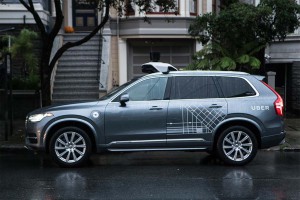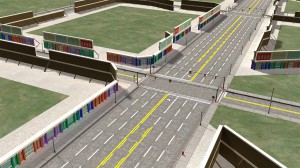
Reaction has been quick in the wake of a fatal Phoenix crash involving a prototype autonomous vehicle operated by ride-sharing service Uber, at least one major automaker saying it will temporarily “pause” testing of its own self-driving vehicles on public roads.
Though police in the suburb of Tempe say preliminary evidence indicates the Uber-modified Volvo SUV was not at fault in the death of a pedestrian Sunday night, the incident has raised flags that could slow the race to put self-driving technology on the road.

While Toyota issued a statement noting that it “cannot speculate on the cause of the incident or what it may mean to the automated driving industry going forward,” the automaker added in a statement that, “Because we feel the incident may have an emotional effect on our test drivers, we have decided to temporarily pause our Chauffeur mode testing on public roads.”
Chauffeur mode is the name for Toyota’s most advanced autonomous technology. The Japanese automaker has reportedly been negotiating with Uber to provide the ride-sharing service with some of its technology.
(Teamsters highlight safety problems with autonomous vehicles. Click Here for the story.)

Separately, a senior Hyundai official told reporters in Seoul on Tuesday that the accident heightens the carmaker’s sense of “cautio(n) about mass producing self-driving cars.” Hyundai director Yoon Sung-hoon emphasized that “No one knows under what situation accidents will occur.”
The Sunday night crash in the Phoenix suburb of Tempe took the life of 49-year-old Elaine Herzberg. It marked the first time a pedestrian was killed by an autonomous vehicle – though the semi-autonomous AutoPilot system in a Tesla Model S was given much of the blame for a May 2016 crash in Florida that killed driver Joshua Brown, a former Navy SEAL.
Uber expressed its condolences and said that it was halting its autonomous vehicle program for the time being. As one of the company’s long-term goals is to reduce costs by eliminating the need for a driver, it is expected to resume development efforts at some point.
The timing could depend upon the results of the investigation into the latest crash. Police officials have indicated Herzberg was pushing her bicycle, loaded with shopping bags, down the median of a four-lane roadway when she unexpectedly turned onto the road, directly into the path of the Uber Volvo, which was cruising at about 38 miles per hour.
Though there was no indication the vehicle attempted to brake or steer clear, Tempe Police Chief Sylvia Moir told the San Francisco Chronicle that, “I suspect preliminarily it appears that the Uber would likely not be at fault in this accident.” But she added, “I won’t rule out the potential to file charges against the [human backup driver] in the Uber vehicle.” Another report has now indicated the backup operator was a repeat felon, 44-year-old Rafaela Vasquez.
Tempe authorities have subsequently backed away from Moir’s statement and federal investigators are now looking into what happened, as well.
Even if the victim ultimately receives blame, the crash could impact the frenetic pace of efforts to commercialize self-driving vehicle technology – and the push by many state and federal regulators to approve testing on public roads, rather than on private facilities like the new American Center for Mobility in the Detroit suburb of Ypsilanti.
(Click Here for details about the self-driving Uber test vehicle killing a pedestrian. )
In Boston, where two autonomous tech firms, Nutonomy and Optimus Ride are based, Mayor Marty Walsh is calling for a halt of public testing on the city’s streets.
In California, where many autonomous vehicle programs are based, and where hundreds of prototypes are now on the road, John Simpson, director of the state’s Consumer Watchdog non-profit, issued a statement demanding “There should be a national moratorium on all robot car testing on public roads until the complete details of this tragedy are made public and are analyzed by outside experts so we understand what went so terribly wrong” in Phoenix.
A growing number of states have authorized public testing, and California recently approved plans for companies like Waymo to begin using completely driverless vehicles. Arizona is set to go a step further, last month authorizing the Google spin-off to launch a fully driverless ride-sharing service.
Waymo has not responded to questions about the Phoenix crash and its own safety record, nor has it indicated whether it might revise plans to begin the commercial ride-sharing service later this year.
At a federal level, Congress has been studying plans that would essentially open up public testing across the U.S., limiting state regulations. Last September, the House of Representatives, in an unusual, bipartisan move, passed the SELF DRIVE Act.
(To see more about Uber expanding autonomous truck testing in Arizona, Click Here.)
The Senate has not yet followed up and it is unclear what, if anything, the Uber crash might mean to efforts in that chamber of Congress. But, referring to the fatal crash in Arizona, Sen. Blumenthal said on Monday, “This tragic incident makes clear that autonomous vehicle technology has a long way to go before it is truly safe for the passengers, pedestrians, and drivers who share America’s roads.”







